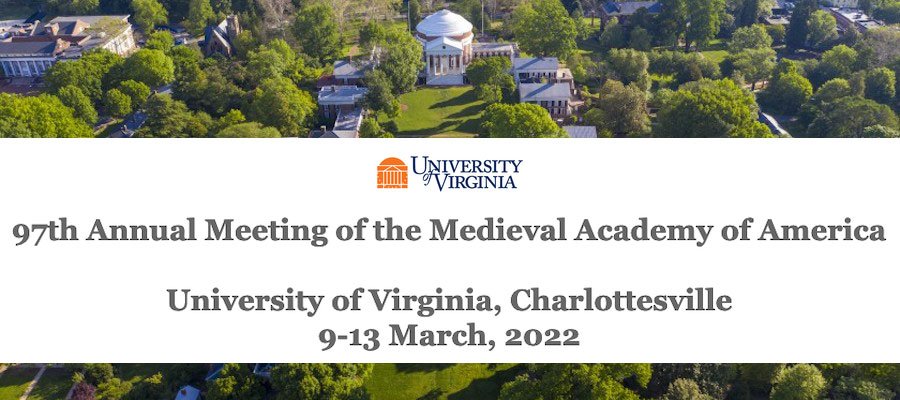97th Annual Meeting of the Medieval Academy of America, University of Virginia, March 9–13, 2022
The 97th Annual Meeting of the Medieval Academy of America will take place on the campus of the University of Virginia in Charlottesville. The meeting is jointly hosted by the Medieval Academy of America and the Program in Medieval Studies at the University of Virginia, with the generous support and collaboration of colleagues from Virginia Tech, the College of William & Mary, and Washington and Lee University. The conference program will feature a diverse range of sessions highlighting innovative scholarship across the many disciplines contributing to medieval studies.
The Program Committee invites proposals for papers on all topics and in all disciplines and periods of medieval studies and medievalism studies. Any member of the Medieval Academy may submit a paper proposal; others may submit proposals as well but must become members in order to present papers at the meeting. Special consideration will be given to individuals whose field would not normally involve membership in the Medieval Academy. We are particularly interested in receiving submissions from those working outside of traditional academic positions, including independent scholars, emeritus or adjunct faculty, university administrators, those working in academic-adjacent institutions (libraries, archives, museums, scholarly societies, or cultural research centers), editors and publishers, and other fellow medievalists.
The Program Committee is committed to fostering conversation around the fifth-year anniversary of the Unite the Right rally in August 2017. Several panels and a plenary session will explore the effects and implications of this moment and its aftermath, including but not limited to the history and theory of race and racism, the appropriation and study of the past, and the future of medieval studies inside and outside the academy. The Program Committee offers the additional themes listed below, and hopes to put in conversation papers that approach each theme from diverse chronological, geographical, methodological, and disciplinary perspectives. We also welcome innovative sessions that cross traditional disciplinary boundaries or that use various disciplinary approaches to examine an individual topic. The themes listed here have been proposed by the Program Committee; the list is not meant to be exhaustive or exclusive.
Themes and threads:
- Race and its intersections
- Political medievalism
- Tyranny and resistance
- Rethinking the global medieval
- Boundaries and limits
- Vulnerability and the ethics of care
- Medieval disability/disabilities
- Gender and identities
- Queering the medieval
- Apocalypse and paradise
- Inter-religious coexistence and conflict
- Diplomacy and ambassadorial practices
- Comparative foodways and cuisines
- Trade and cultural exchange
- Environment and ecology
- Pedagogies: material, digital, embodied
- Medieval materialisms
- Restoration, preservation, looting
- Passions and emotions
- Transhistorical poetics
- Comparative text technologies
- Plague and pandemic
- Revelation and reason in medieval science
Individuals may propose to offer a paper addressing one of the themes, a full panel of papers and speakers for a listed theme, a full panel of papers and speakers for a session they wish to create, or a single paper not designated for a specific theme. Sessions usually consist of three 25-minute papers, and proposals should be geared to that length, although the committee is interested in other formats as well (roundtables, poster sessions, digital experiences, etc.).
